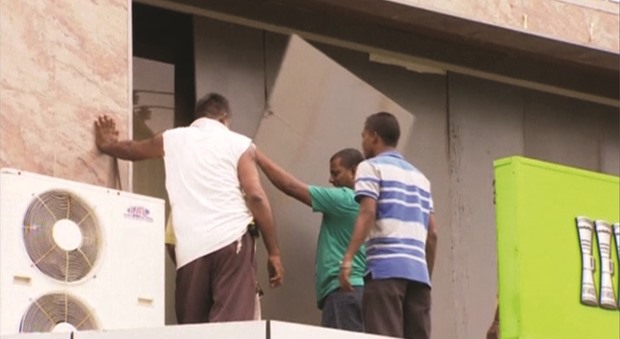
Men board up a shop in preparation for Cyclone Winston in Suva in this still image taken from video.
Fiji was struck by its most powerful ever cyclone yesterday, according to reports, as the island nation battened down the hatches with a curfew and evacuations.
The category five super-storm hit the main island of Viti Levu overnight, according to the Joint Typhoon Warning Centre, with flights cancelled and evacuation centres activated earlier in the day.
Category 5 is the highest ranking on the hurricane wind scale.
“As a nation, we are facing an ordeal of the most grievous kind,” Prime Minister Voreqe Bainimarama said in a national address. “We must stick together as a people and look after each other. Be alert and be prepared.”
“We cannot afford to be complacent,” Australian broadcaster ABC quoted the prime minister as saying. “And I am especially concerned that some people in urban areas do not appear to have heeded the warnings about the seriousness of the threat.”
Severe tropical cyclone Winston, with average winds of 220kph (136mph) and gusts of up to 315kph, was the first-ever category five storm to hit the nation, the Fiji Times reported.
The storm caused power to fail across the main island after making landfall, according to local reports.
“This mega storm has the potential to cause catastrophic damage across Fiji, an island nation frequented by hundreds of thousands of holiday-goers every year,” said Iris Low-McKenzie, chief executive of Save the Children Fiji. “It looks as though the storm could pass over the international airport in Nadi, which, if significant damage is caused, will make the humanitarian response all the more difficult.”
The Fijian government declared a state of natural disaster in the country, which would remain in place for one month.
National Disaster Management director Akapusi Tuifagalele told the Fijilive website that 758 evacuation centres had been set up in the nation with a population of about 900,000.
Winston brushed by the more northerly island of Vanua Levu yesterday afternoon, with unconfirmed reports of trees felled and roofs blown off houses.
“I’ve never seen such a strong cyclone as this one in 60 years,” resident Zalim Hussein told AFP by phone. “This is a monster cyclone, without doubt the strongest we’ve ever experienced. We’re all very scared and hope it goes away quickly.”
Fiji Airways, Virgin Australia and Jetstar all cancelled flights to the holiday hotspot, which is a popular destination for Australians and New Zealanders.
The government imposed a nationwide curfew last night, with the prime minister warning residents not to go outdoors.
“The threat of being hit by flying debris is extremely high,” he said.
“A total public curfew will take effect across the country today from 6pm,” The government said on Facebook.
Winston has been moving around the South Pacific for a week, skirting around Vanuatu and Tonga and has previously taken aim at Fiji before veering away.
Cyclones are common in the South Pacific and their impact is notoriously difficult to predict, with major storms capable of causing major devastation but sometimes blowing themselves out with relatively little damage.
As Fiji’s weather service warned people in the east to “expect very destructive hurricane-force winds”, Suva resident Alice Clements said the power had failed just after 5pm and she expected water supplies to be hit next.
“I have palm trees flying all around me at the moment,” Clements, an official with a UN agency, told Reuters.
The UN Office for the Co-ordination of Humanitarian Affairs (OCHA) said that it was ready to support the disaster management office if required.
Winston had the potential to bring “destructive winds, heavy rains, dangerous storm surge and a high risk of both flash and river flooding”, the OCHA said in a statement.
The OCHA said that Winston was following a path that might spare Suva the full force of its winds.
“The cyclone has tracked further north than expected over the past 24 hours,” the UN agency said.
